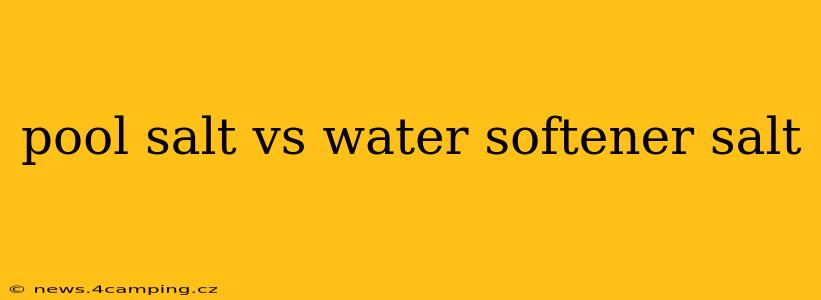Choosing the right salt for your needs can seem confusing, especially when faced with the options of pool salt and water softener salt. While both are essentially sodium chloride (NaCl), there are key differences that make them unsuitable for interchangeable use. Understanding these distinctions is crucial for maintaining your pool and water softener effectively and safely.
What is Pool Salt?
Pool salt, also known as swimming pool salt, is a specifically formulated grade of sodium chloride designed for use in chlorinators. These systems use electrolysis to convert the salt into chlorine, which sanitizes the pool water. The purity level of pool salt is vital; impurities can damage the chlorinator cell and reduce its lifespan. Therefore, pool salt undergoes a refined purification process to minimize contaminants like magnesium and calcium. This high purity ensures efficient chlorine production and prevents scaling or buildup in the system.
What is Water Softener Salt?
Water softener salt, often called "water conditioning salt," is used in water softeners to regenerate the ion exchange resin. This resin removes hard water minerals (calcium and magnesium) by exchanging them for sodium ions. While also primarily sodium chloride, water softener salt often has higher levels of impurities compared to pool salt. These impurities are generally not harmful to the water softener itself, but they are harmful to a pool chlorinator. The presence of these impurities can lead to inefficient chlorine generation, scaling, and ultimately, damage to the chlorinator.
Can I Use Water Softener Salt in My Pool?
No, you should never use water softener salt in a pool chlorinator. The higher impurity levels in water softener salt can significantly reduce the lifespan of your chlorinator cell and compromise the effectiveness of your pool's sanitation system. Using impure salt can lead to:
- Reduced Chlorine Production: Impurities clog the chlorinator cell, hindering the electrolysis process and reducing the amount of chlorine generated.
- Cell Damage: These impurities can corrode or damage the chlorinator cell, leading to premature failure and costly repairs or replacements.
- Cloudy Water: Impurities can leave residue in the pool water, causing cloudiness and affecting the overall water quality.
Can I Use Pool Salt in My Water Softener?
While using pool salt in a water softener might not immediately damage the unit, it’s generally not recommended. The higher cost of pool salt makes it an inefficient choice for water softening. Furthermore, any minor impurities removed during the purification of pool salt are inconsequential to the functionality of a water softener, meaning you are paying more for a product offering no added benefit. Stick to the more economical water softener salt.
What are the Key Differences Between Pool Salt and Water Softener Salt?
| Feature | Pool Salt | Water Softener Salt |
|---|---|---|
| Purity | High purity, low levels of impurities | Lower purity, higher levels of impurities |
| Cost | More expensive | Less expensive |
| Intended Use | Pool chlorinators | Water softeners |
| Impurity Impact | Impurities can severely damage chlorinators | Impurities have minimal impact on softeners |
How Do I Choose the Right Salt?
The choice is straightforward: always use pool salt in your pool chlorinator and water softener salt in your water softener. Purchasing the correct type of salt prevents costly repairs and ensures optimal performance of both your pool and water softening systems. Reading product labels carefully will help you identify the intended use of each type of salt.
What's the Best Type of Pool Salt?
The "best" type of pool salt depends on your specific needs and budget. Look for pool salt that clearly states its suitability for chlorinators and its purity level. Always follow the manufacturer's recommendations for salt type and quantity.
Are there different grades of water softener salt?
Yes, there are different grades of water softener salt, typically based on the size and shape of the crystals (e.g., pellet, coarse, fine). These variations primarily affect the rate of dissolution, impacting the efficiency of the water softener's regeneration cycle. However, the purity level for water softener salt will be significantly lower than that of pool salt, regardless of the grade.
